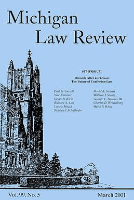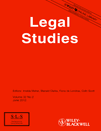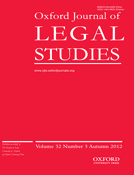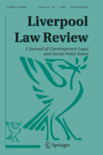
MICHIGAN LAW REVIEW
Scope & Guideline
Your Gateway to Influential Legal Scholarship
Introduction
Aims and Scopes
- Interdisciplinary Legal Analysis:
The journal emphasizes the integration of various disciplines, such as sociology, political science, and economics, into legal analysis, allowing for a multifaceted understanding of legal issues. - Focus on Social Justice and Equity:
A significant portion of the journal's publications addresses themes of social justice, equity, and civil rights, reflecting a commitment to examining the law's impact on marginalized communities. - Critical Examination of Legal Doctrines and Policies:
Articles often critically assess existing legal doctrines, policies, and practices, proposing reforms based on contemporary societal needs and values. - Exploration of Emerging Legal Issues:
The journal is dedicated to exploring emerging legal challenges, particularly those arising from technological advancements, social movements, and global changes. - Historical Contextualization:
Many articles provide historical context to current legal issues, helping readers understand the evolution of legal concepts and their implications for modern law.
Trending and Emerging
- Digital Privacy and Surveillance:
A surge in articles addressing digital privacy rights and the implications of surveillance technologies highlights an increasing concern for individual rights in the digital age. - Criminal Justice Reform:
There is a growing focus on reforming the criminal justice system, particularly in relation to mass incarceration, police practices, and the intersection of race and justice. - Environmental Law and Climate Justice:
Emerging themes around environmental law and the legal implications of climate change underscore the urgency of legal frameworks that address environmental justice. - Corporate Responsibility and Ethics:
An increasing interest in corporate responsibility, particularly regarding ethical practices and the legal obligations of corporations to society, reflects a broader societal call for accountability. - Intersectionality in Law:
The exploration of intersectionality, particularly how various identities (race, gender, disability) affect legal outcomes and rights, is becoming a prominent area of scholarship.
Declining or Waning
- Traditional Legal Formalism:
There has been a noticeable decrease in articles focusing on traditional legal formalism and strictly doctrinal analyses, as the journal increasingly prioritizes interdisciplinary and social justice-oriented perspectives. - Conventional Law and Economics:
The scope of conventional law and economics discussions appears to be waning, with fewer articles adopting a purely economic lens without integrating broader social implications. - Focus on Established Legal Precedents:
The journal is moving away from extensive discussions centered solely on established legal precedents, favoring instead innovative and reformative approaches that challenge the status quo. - Narrowly Defined Legal Issues:
There is a decline in publications that deal with narrowly defined legal issues, as the journal shifts toward broader, more complex themes that intersect with societal challenges. - Historical Legal Narratives:
While historical context remains important, the journal seems to be publishing fewer articles focused exclusively on historical legal narratives without connecting them to present-day issues.
Similar Journals

INDIANA LAW JOURNAL
Navigating the Evolving Legal LandscapeINDIANA LAW JOURNAL, a premier publication in the field of law, serves as a vital platform for scholarly discourse and legal scholarship. Established in 1973 and originating from the Indiana University School of Law in Bloomington, this esteemed journal publishes a diverse range of articles, essays, and commentary from both established and emerging legal scholars. With an impressive Scopus Rank of #350 out of 1025 in the Social Sciences domain, placing it in the 65th percentile, the journal is recognized for its contributions to the legal academic community. Its 2023 category quartile ranking of Q2 underscores its significance and relevance, ensuring that published works are widely acknowledged and cited. Although not an open access journal, the INDIANA LAW JOURNAL is committed to fostering robust academic exchanges and enhancing understanding in various legal fields, making it an indispensable resource for researchers, professionals, and students alike. With a history of convergence in publication timelines, it continues to evolve in response to the continually changing legal landscape.

UNIVERSITY OF CINCINNATI LAW REVIEW
Innovating Legal Perspectives for Tomorrow's ChallengesUNIVERSITY OF CINCINNATI LAW REVIEW is a distinguished academic journal in the field of legal studies, published by the University of Cincinnati College of Law. With an ISSN of 0009-6881 and an E-ISSN of 1942-8391, this journal serves as an essential platform for the dissemination of scholarly research and critical discourse in law. The review covers a wide range of topics, including constitutional law, contracts, criminal law, and legal theory, appealing to both practitioners and scholars alike. Although it is not open access, the journal maintains a significant influence with an HIndex reflecting its academic impact. As part of the Social Sciences - Law category, it ranks 434 out of 685 journals in Scopus, placing it within the 36th percentile, underscoring its valuable contribution to legal scholarship. Research featured in the University of Cincinnati Law Review aims to foster a deeper understanding of legal issues and stimulate ongoing academic conversations, making it an invaluable resource for anyone engaged in the study or practice of law.

COLUMBIA LAW REVIEW
Illuminating Critical Legal Issues with Scholarly PrecisionCOLUMBIA LAW REVIEW, published by the COLUMBIA JOURNAL TRANSNATIONAL LAW ASSOCIATION, is one of the foremost legal journals in the United States, committed to advancing the discourse on critical legal issues. With an ISSN of 0010-1958 and an E-ISSN of 1945-2268, this prestigious publication has established a strong reputation, reflected in its Q1 rank in Law and a Scopus ranking of #145 out of 1025 journals in the social sciences category, placing it in the 85th percentile. COLUMBIA LAW REVIEW serves as a vital platform for legal scholars, practitioners, and students, publishing notable articles, case studies, and commentaries that influence both academic and practical perspectives on law. With a publication history spanning multiple decades, from its converged years of 1973 to 2024, it remains a key resource for those looking to stay updated on contemporary legal thought and developments. While it operates under a traditional subscription model, the journal’s rigorous peer-review process ensures the highest quality of scholarship in the legal field, solidifying its importance for both emerging and established legal professionals.

Denver Law Review
Shaping the future of law with impactful scholarship.Welcome to the Denver Law Review, a distinguished journal published by the University of Denver, Sturm College of Law that serves as a pivotal platform for the exploration and discussion of contemporary legal issues. With its ISSN of 2469-6463, the journal has established itself within the legal scholarship community, holding a notable Q2 rank within the field of Law according to the 2023 category quartiles. The Denver Law Review is committed to advancing legal research and scholarship, providing open access to critical insights and analyses essential for practitioners, scholars, and students alike. With an impact factor bolstered by its Scopus ranking at 620/1025, the journal facilitates rich scholarly conversations and promotes the understanding of the law in today's dynamic context. We invite you to explore the innovative articles and research that contribute to the evolving landscape of jurisprudence.

QUEENS LAW JOURNAL
Fostering Critical Analysis in Legal StudiesQUEENS LAW JOURNAL is a prestigious legal journal published by Queen's University, Faculty of Law, located in Kingston, Ontario, Canada. With its ISSN 0316-778X, the journal serves as a key platform for academic discourse and research in the field of law, encompassing various disciplines such as criminal law, constitutional law, and international law. Although currently not available as Open Access, the QUEENS LAW JOURNAL maintains a strong reputation for publishing impactful research, making it a vital resource for legal scholars, practitioners, and students alike. By fostering an environment for innovative legal theories and critical analyses, the journal plays an essential role in advancing legal scholarship and promoting informed discussions on pertinent legal issues. Emphasizing quality and rigor, the QUEENS LAW JOURNAL is a valuable addition to any academic library and serves as a trusted reference for those engaged in the legal profession.

Legal Studies
Transforming Legal Research into PracticeLegal Studies, published by Cambridge University Press, is a leading journal in the field of law, recognized for its commitment to advancing scholarly dialogue and critical analysis of legal issues. With an ISSN of 0261-3875 and an E-ISSN of 1748-121X, this prestigious journal has been a key resource for researchers, practitioners, and students since its inception in 1981, and it continues to serve the academic community through rigorous peer-reviewed research up to 2024. Positioned in the Q2 category of law journals and ranked within the 60th percentile among social sciences law publications in Scopus, Legal Studies offers a unique platform for innovative legal scholarship, exploring contemporary legal phenomena and their societal implications. Although not an open-access journal, it provides subscribers and institutional partners with exclusive access to high-quality articles that inform legal thought and practice. The journal’s aim is to foster interdisciplinary perspectives and to challenge traditional viewpoints, making it an indispensable tool for anyone engaged in the legal field.

Oxford Journal of Legal Studies
Elevating Understanding of Complex Legal FrameworksThe Oxford Journal of Legal Studies, published by Oxford University Press, stands as a prestigious platform for scholarly discourse within the field of law. Renowned for its impactful contributions to legal scholarship since its inception in 1981, this journal has established itself in the top tier of its category, currently classified as Q1 in Law based on the 2023 category quartiles. With its ISSN 0143-6503 and E-ISSN 1464-3820, the journal provides a comprehensive exploration of contemporary legal issues, theoretical perspectives, and empirical research, attracting contributions from leading academics and practitioners alike. Residing within the Social Sciences arena, it holds an impressive rank of 194/1025, landing it in the 81st percentile according to Scopus rankings. Though not currently an open-access publication, the Oxford Journal of Legal Studies remains vital for researchers, professionals, and students eager to deepen their understanding of legal frameworks and contemporary challenges within the legal landscape. Located in the heart of the United Kingdom, at Great Clarendon St, Oxford OX2 6DP, England, the journal is an indispensable resource for those advancing the study and practice of law.

ALBERTA LAW REVIEW
Pioneering discussions in constitutional and social justice.ALBERTA LAW REVIEW, published by the University of Alberta, stands as a key academic journal in the field of law, contributing to the discourse on legal issues and developments in Canada and beyond. With an ISSN of 0002-4821 and an E-ISSN of 1925-8356, this journal has been pivotal since its inception in 1974, providing a platform for legal scholarship that spans a diverse range of topics, from constitutional law to social justice. Although it operates under a traditional subscription model, the journal's illustrious history and rigorously peer-reviewed content affirm its stature in advancing legal research and education. The Alberta Law Review not only serves as a resource for academics and students, but also offers legal practitioners critical insights and analysis pertinent to contemporary legal challenges. With a commitment to enlightening the discourse around law, it is an invaluable asset for anyone engaged in the legal profession or related fields.

VANDERBILT LAW REVIEW
Advancing Legal Scholarship with ImpactVANDERBILT LAW REVIEW, published by the Vanderbilt University School of Law, stands as a pivotal journal in the field of legal scholarship. Established in the United States, this esteemed journal has garnered a reputation for excellence, reflecting its Q1 category ranking in Law as of 2023 and achieving a respectable Scopus rank of #207 out of 1025 in the social sciences category, placing it in the 79th percentile. With a history that dates back to its initial issues between 1973 and 1976, it continues to serve as a crucial platform for innovative legal research and discourse. The VANDERBILT LAW REVIEW is dedicated to enhancing legal understanding by publishing rigorous articles that impact both scholarly and practical dimensions of law. The journal remains a vital resource for researchers, practitioners, and students alike, fostering an environment of intellectual engagement and legal inquiry.

Liverpool Law Review
Connecting Researchers and Practitioners in Legal DiscourseLiverpool Law Review, published by Springer, is a prestigious open-access journal in the field of law, dedicated to fostering scholarship and promoting dialogue on contemporary legal issues. Since its inception, the journal has evolved significantly, with a publishing history dating back to 1979 and showcasing an extensive range of articles and reviews that contribute to the development of legal theory and practice. The journal is indexed under Scopus, ranking #352 out of 1025 in the Social Sciences category, placing it in the 65th percentile—indicative of its solid reputation and relevance in the field. Liverpool Law Review provides an engaging platform for researchers, professionals, and students alike by facilitating access to high-quality legal research, with full open access available since 2012, ensuring that vital academic discussions are accessible to a global audience. With its commitment to exploring both historical and contemporary issues in law, this journal remains an essential resource for those seeking to deepen their understanding and contribute meaningfully to the legal landscape.